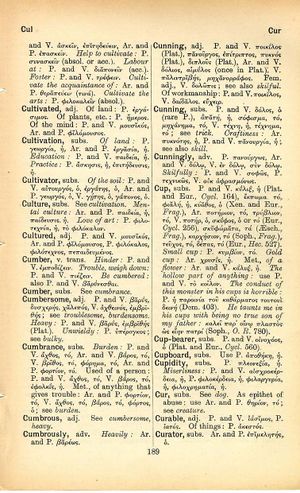cup: Difference between revisions
νῆα μὲν οἵ γε μέλαιναν ἐπ' ἠπείροιο ἔρυσσαν ὑψοῦ ἐπὶ ψαμάθοις, ὑπὸ δ' ἕρματα μακρὰ τάνυσσαν → they pushed the black ship up over the sand onto dry land and placed long beams under her
m (Woodhouse1 replacement) |
m (Text replacement - "''Fragment''" to "''Fragment''") |
||
| Line 3: | Line 3: | ||
===substantive=== | ===substantive=== | ||
[[prose|P.]] and [[verse|V.]] [[κύλιξ]], ἡ ([[Plato]] and [[Euripides|Eur.]], ''[[Cyclops]]'' 164), [[ἔκπωμα]], τό, [[φιαλή]], ἡ, [[κύαθος]], ὁ ([[Xenophon|Xen.]] and [[Euripides|Eur.]],. ''Fragment''), [[Aristophanes|Ar.]] [[ποτήριον]], τό, [[τρύβλιον]], τό, [[verse|V.]] [[ποτήρ]], ὁ, [[σκύφος]], ὁ or τό ([[Euripides|Eur.]], ''[[Cyclops]]'' 256), [[σκυφώματα]], τά ([[Aeschylus|Aesch.]], ''Fragment''), [[καρχήσιον]], τό ([[Sophocles|Soph.]], '' | [[prose|P.]] and [[verse|V.]] [[κύλιξ]], ἡ ([[Plato]] and [[Euripides|Eur.]], ''[[Cyclops]]'' 164), [[ἔκπωμα]], τό, [[φιαλή]], ἡ, [[κύαθος]], ὁ ([[Xenophon|Xen.]] and [[Euripides|Eur.]],. ''Fragment''), [[Aristophanes|Ar.]] [[ποτήριον]], τό, [[τρύβλιον]], τό, [[verse|V.]] [[ποτήρ]], ὁ, [[σκύφος]], ὁ or τό ([[Euripides|Eur.]], ''[[Cyclops]]'' 256), [[σκυφώματα]], τά ([[Aeschylus|Aesch.]], ''Fragment''), [[καρχήσιον]], τό ([[Sophocles|Soph.]], ''Fragment'' ), [[τεῦχος]], τό, [[δέπας]], τό ([[Euripides|Eur.]], ''[[Hecuba]]'' 527). | ||
[[small cup]]: [[prose|P.]] [[κυμβίον]], τό. | [[small cup]]: [[prose|P.]] [[κυμβίον]], τό. | ||
Revision as of 17:34, 19 July 2020
English > Greek (Woodhouse)
substantive
P. and V. κύλιξ, ἡ (Plato and Eur., Cyclops 164), ἔκπωμα, τό, φιαλή, ἡ, κύαθος, ὁ (Xen. and Eur.,. Fragment), Ar. ποτήριον, τό, τρύβλιον, τό, V. ποτήρ, ὁ, σκύφος, ὁ or τό (Eur., Cyclops 256), σκυφώματα, τά (Aesch., Fragment), καρχήσιον, τό (Soph., Fragment ), τεῦχος, τό, δέπας, τό (Eur., Hecuba 527).
Met., of a flower: Ar. and V. κάλυξ, ἡ.
the hollow part of anything: use P. and V. τὸ κοῖλον.
the conduct of this monster in his cups is horrible: P. ἡ παροινία τοῦ καθάρματος τουτουῒ δεινή (Dem. 403).
he taunts me in his cups with being no true son of my father: καλεῖ παρ' οἴνῳ πλαστὸς ὡς εἴην πατρί (Soph., Oedipus Rex 780).

